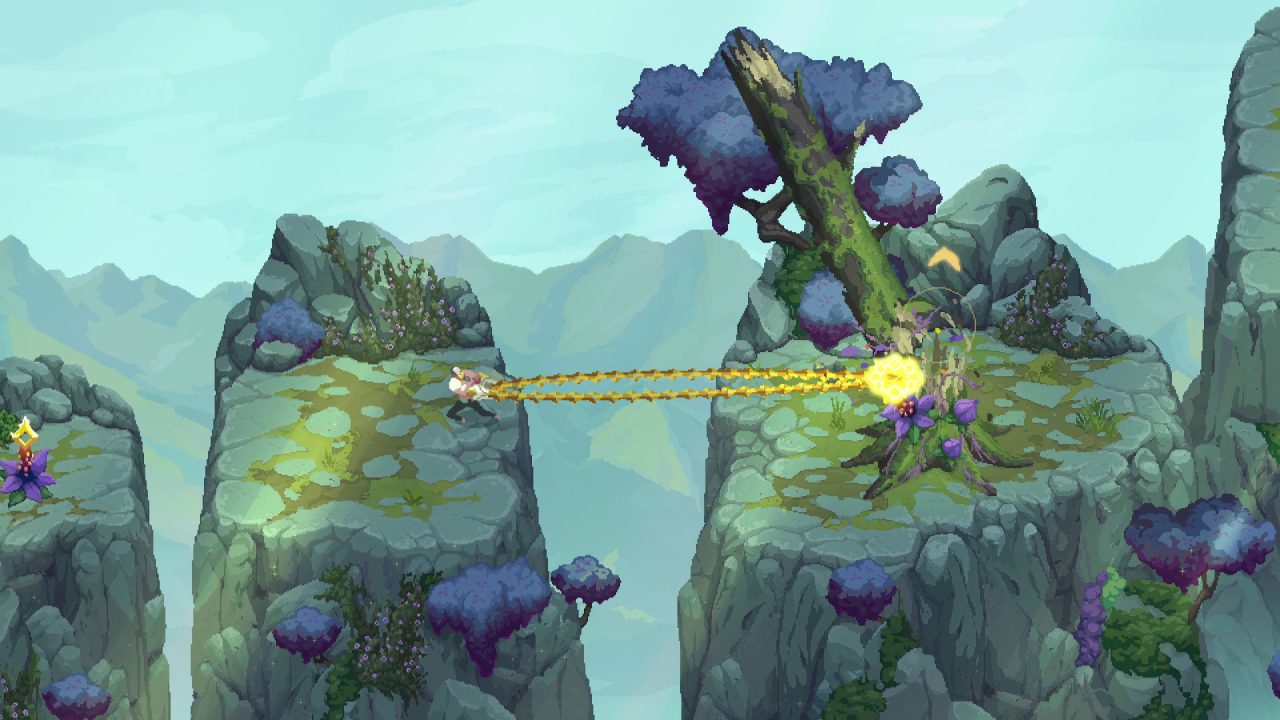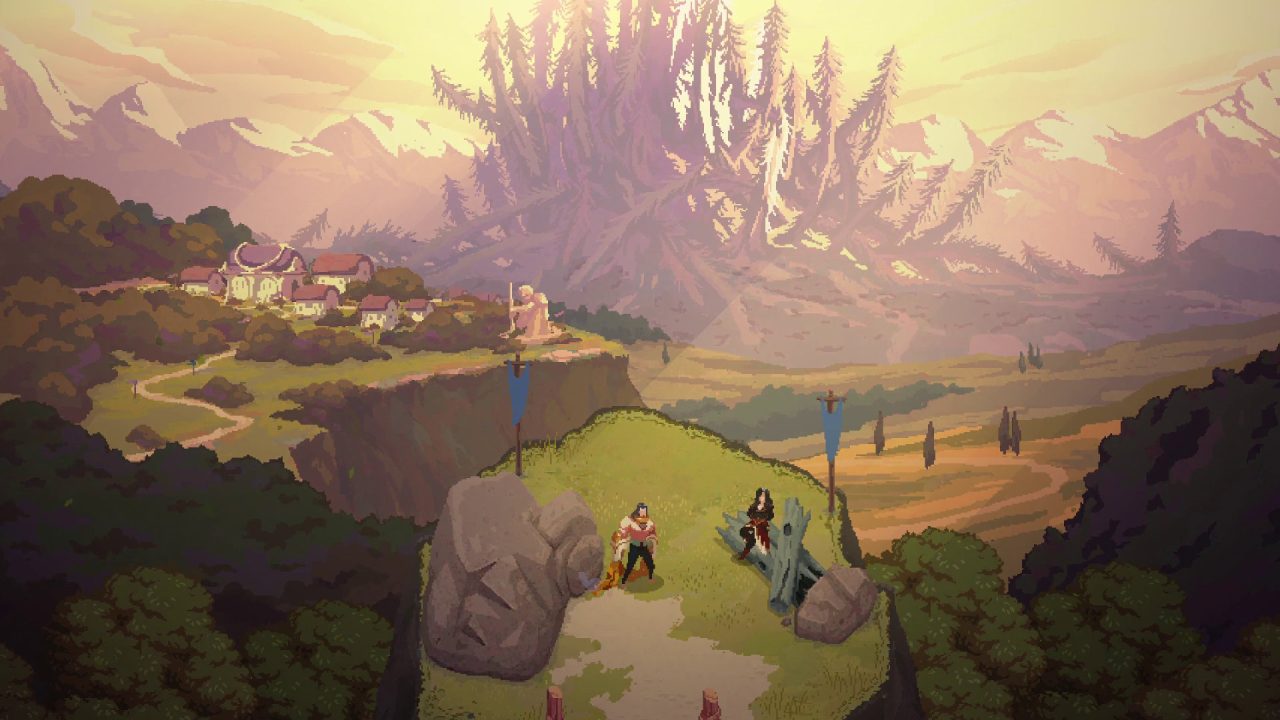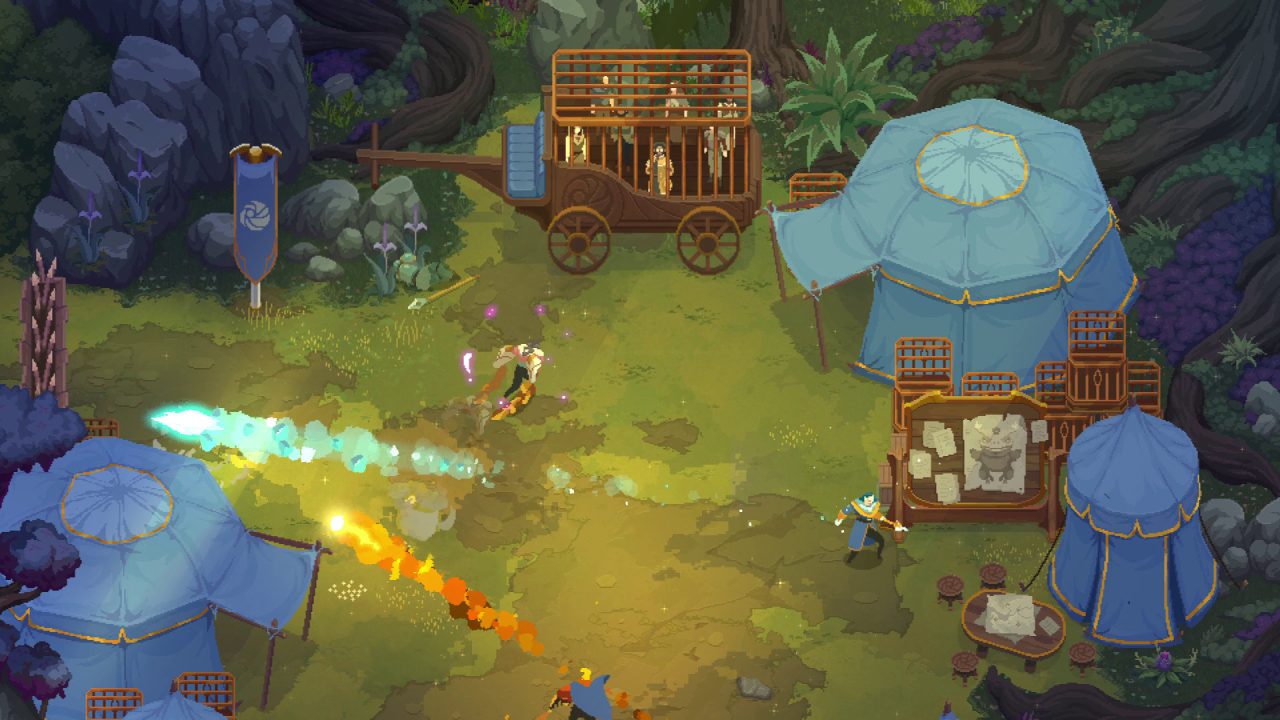Riot’s recently been handing out their coveted League of Legends property to a few developers who (I assume) they trust to make a quality title using their characters and world. I had the pleasure of reviewing Ruined King: A League of Legends Story with glowing praise. The Mageseeker: A League of Legends Story is the latest of these hand-offs in the form of a top-down action RPG with a pixelated aesthetic. Without a doubt, the pixelwork is phenomenal with its level of detail and little touches, like walking by a chain connected to a wall and watching it momentarily sway. Contributing to the aesthetic, the music is decent enough to maintain one’s attention. What about the actual gameplay and writing, though? Well, that—is another matter altogether.
Mageseeker follows Sylas, a still-popular melee mage in League of Legends who uses chains tethered to his arms to thump enemies over the head and sometimes steal their spells. In Mageseeker, he’s much the same, and we get a bit more detail about his background. Out of the gate, we witness young Sylas serving as a mageseeker—someone who hunts those who use magic for the Kingdom of Demacia—yet unable to control his own magic ability, causing a catastrophic accident that kills innocents in a giant explosion. Following this, he remains chained to a wall until he steals the magic of a dear friend, Lux, to break out of his prison. The incredibly buff former prisoner with no ability to move while in captivity joins a mage-led rebellion to get revenge on his captors.
For the majority of the game, players engage in a flow between walking around the rebellion base, talking to rebels, and taking missions to chip away at the mageseekers and Demacian rule. Whether saving captured mages or knocking down a leading figure in the Demacian hierarchy, Mageseeker is a tired affair that’s not only cookie-cutter but shockingly bland. While I don’t mind formulaic gameplay—I love games with a similar flow, like Shadowrun—it’s certainly not the best way to design an experience because everything else needs to justify it.

Mageseeker’s characters are archetypes. We have the angry kid, the benevolent rebel leader, the gristly elder, and the revenge-driven and flawed protagonist. The story beats aren’t just predictable: they’re cliché. At hour one, I knew everything that was going to happen because nothing about the beginning screamed innovation or depth. Every character sounds the same and doesn’t have much to say outside of what is immediately relevant to the story, yet somehow the conversations Sylas has with each of them drag on without conveying anything of import or fascination. Every conversation, while ostensibly about something else entirely, always falls back on the singular character trait we know about that NPC. Sylas isn’t much better with his one-track mind on revenge. Scribbles littered around every map aren’t any better, as they’re walls of text seemingly intended to add flavor to the world but end up feeling like pointless lore dumps without any flair.
Okay, so the writing doesn’t do Mageseeker any favors. What about gameplay? A key feature of any action RPG is sound controls. Even in games like Dark Souls where heavy swings and limited stamina bars can hinder mobility, they always feel authentic in their delivery. We choose to be a massive hulk of damage, and we pay the price for it. Here, Sylas seems like he’s intended to be mobile, but combat and moving around maps always feels stiff. I don’t have a sense of flow. Every time I zip around with dashes, I feel like I’m hitting a wall and can’t get what I want done. Mageseeker features combos that allow Sylas to use special abilities without expending mana, but these are exceedingly hard to pull off despite the simple combination of heavy and light attacks. Up until the 15-hour mark, I still couldn’t consistently pull off a light-light-heavy attack combo. I had better luck button mashing, which is incredibly deflating.

Typically, Sylas enters a map and has to get from point A to point B. He eventually finds himself in a section of the map—a square with a couple obstacles in the middle of the room, usually—where enemies spawn and the walls to exits and entrances go up. Fight the enemies, get out, move around the map, find treasure, fight more enemies, and continue until a boss fight. A game featuring spells should make combat exciting, because magic can do anything, right? Here, we have fire, ice, wind, nature, light, and dark. Sylas can capture spells from enemies to use them on the fly during the mission without expending mana and later learn them permanently after the mission is over. We have all sorts of patterns, including missile shot, area-of-effect, damage-over-time, teleports, and so on. Yet, combat is so incredibly dull and repetitive that I didn’t care about enemy attack patterns. Sylas is strong enough to get through all of the fights on normal difficulty without even coming close to dying, yet enemies sponge damage even after maxing out Sylas’ damage output in town. In essence, the stakes are low, but every wave of enemies feels exhausting because they take so long. The only fights that matter are boss fights, which are, admittedly, well-designed.
I had a lot of fun exchanging blows with most of the bosses in Mageseeker. Learning attack patterns, adapting to changing boss weaknesses, and puzzling out how to break through a boss’s defenses was a breath of fresh air in a game that feels constructed around padding. Unfortunately, getting to the bosses is laborious, and not just because of the fights encountered along the way: Mageseeker boasts branching paths that either lead to treasure or progress the mission, which devolves into the player trying to guess which is the right or “wrong” path so as not to miss currency. This is a tired, annoying mechanic because finding a checkpoint to replenish one’s health and mana clearly means the player missed a collectible or treasure.

Treasures don’t amount to much, though. Every treasure chest holds a nominal amount of money used in town to upgrade a basic stat of Sylas’ or teach him newly discovered spells. The stats are unimaginative in that they increase a nebulous bar of defense, magic power, health, and so on; as suggested earlier, increasing Sylas’ damage output doesn’t seem to help him kill enemies any faster, but I am reluctant to imagine what it would be like to fight enemies without increasing my damage. Learning spells seems like it’d be exciting, but with only four spell slots, players are likely to keep what they’re comfortable with or just use the latest, most potent spell despite the attack pattern.
The Mageseeker: A League of Legends Story is a harrowing combination of unimaginative, tired game design and stale writing. I hate tearing the game down because I believe the developers worked hard on it, but this is a League of Legends game that is going to attract fans of the Multiplayer Online Battle Arena (MOBA). While this $30, 15-hour game feels like 45 hours to complete, that’s $2 per hour of pain. I couldn’t wait for the game to be over, and if I weren’t reviewing it, I would have quit by the fifth hour. I don’t care how much of a League of Legends fan you are, attractive pixel art and decent boss battles aren’t enough to justify this investment.


